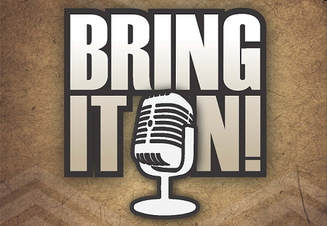 Chamber CEO Erin Predmore joined a panel and Bring It On! hosts William Hosea and Cornelius Wright to discuss the state of black-owned businesses and the entrepreneurial resources available to them. The show aired on Oct. 19, 2020 on WFHB 91.3 FM. A recording is available here. Other panelists were Virginia Githiri, lecturer at the IU School of Health and owner of Popcorn Kernels with a Twist; and Jim Adams, III, the territory sales leader for State Farm Insurance. The Chamber has been working with a Black-Owned Business Affinity Group to help support and grow black-owned businesses in our community.
0 Comments
 Note: This "It's Your Business" column by Erin Predmore, the Chamber's President & CEO, first appeared in the Aug. 14 issue of the Bloomington Herald-Times. Earlier this summer, we unveiled an important historical marker for our community as a whole, for the business community and, most importantly, for the Black business community. In the 1960s, a business called The Black Market operated in the spot where Peoples Park is located now. Owned and run by Indiana University grad student Rollo Turner, it was a Bloomington store celebrating Black culture, with African art, clothing and music. It was a welcoming place for Black IU students and community members to gather. On Dec. 26, 1968, in a violent reaction to the civil rights movement, the Black Market was firebombed. What was one moment a thriving, locally owned business and center for Black culture became in the next moment a burning symbol of hatred and racism. The store was destroyed in the fire. As time passed, this location became a gathering place for local students, civil rights activists and other residents. The family that owned it later gave this land to the city of Bloomington to be maintained forever as a public park — Peoples Park. But as time passed, the story of this place — The Black Market, the firebombing, and its place in the history of the local civil rights movement — was left behind. People stopped telling others about it, and many residents never knew what happened here. I first learned about this history almost two years ago, when the Greater Bloomington Chamber of Commerce began working with leaders in the Black business community in an effort that led to the formation of the chamber’s Black-Owned Business Affinity Group. With their leadership, we partnered with the city of Bloomington to submit an application to the Indiana Historical Bureau. That work led to the installation of an historical marker at Peoples Park that we celebrated on July 31. But really, we were celebrating our community’s Black business owners and acknowledging that what happened here in 1968 still matters to Bloomington today. We forget that history at our peril. The treatment of people of color in Bloomington and Monroe County has been horrible, ranging from microaggressions at work to racial profiling to physical violence. Taking a stand against these behaviors is required by of all of us who want to be decent and humane. For those who don’t believe this is a moral issue or don’t acknowledge that racism still exists here, at least consider the economic impact of our community’s reputation. This summer, our office has fielded calls and emails from individuals and groups who were no longer willing to come to Bloomington because of the racist actions of some of our community members. In 2018, visitors spent over $418 million in Monroe County. What would we do if they all decided not to come back after the pandemic abates? Here’s another harsh reality, from the Monroe County Quality of Place & Workforce Retention Plan: “Minority residents do not feel the sense of welcoming community that Monroe County prides itself on. The legacy of the KKK in the region is remembered and felt today. Recruiters have trouble attracting diverse candidates to the region, to Monroe County, and to Bloomington.” Our community’s success is intricately tied to the success of our neighbors, friends and colleagues. We will all rise or fall together, and we can only rise by supporting those who need to be recognized as valuable members of our community. We must embrace the minority members of our community and stand for equality, equity and inclusion. To all people of color, the chamber is glad you are here. 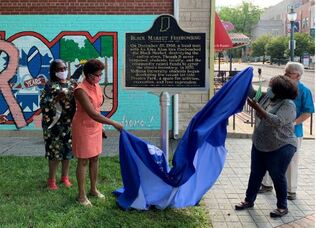 At a July 31 event featuring leaders of Bloomington's Black business community and city officials, the Chamber led a ceremony to install an Indiana historical market in Peoples Park. The maker commemorates the Black Market, a Black-owned business that was firebombed in 1968. This ends a process that officially began in the summer of 2019 with an application to the Indiana Historical Bureau, in partnership with the Chamber's Black-Owned Business Affiliate Group and the City of Bloomington. Peoples Park was originally the location of the Black Market in Bloomington, opened by Rollo Turner in 1968 on land owned by Larry Canada, a businessman and antiwar activist. This was a peaceful gathering place for citizens of Bloomington as well as Indiana University students where LPs, books, artwork, and African imports were sold. On December 26th, 1968, the Black Market was firebombed by the local members of the KKK. Ultimately, the Market was forced to close after all inventory was lost. Not long after, the building that housed the Black Market was razed, leaving an empty plot of land. In the early 1970’s, Indiana University students started plantings flowers and vegetation in the area, eventually naming it Peoples Park in honor of a park at UC-Berkeley. Click here to watch a video of the event. 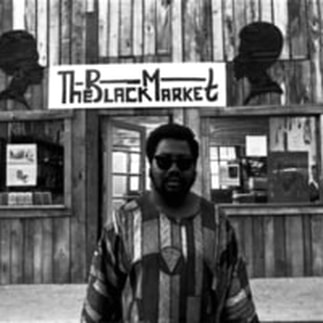 Rollo Turner at The Black Market in 1968. Rollo Turner at The Black Market in 1968. The Greater Bloomington Chamber of Commerce is holding an installation ceremony for a historical marker at Peoples Park in Bloomington to mark the location of the Black Market, a Black-owned business that was firebombed in 1968. The installation will take place on Friday, July 31 at 10 a.m. at Peoples Park, 501 E Kirkwood Ave. (the northeast corner of Kirkwood and Dunn). This ends a process that officially began in the summer of 2019 with an application to the Indiana State Historical Society. The Chamber had originally planned to have this event and marker installation in May, but due to the COVID-19 pandemic, plans were rescheduled for this month. “We are looking forward to finally being able to honor Peoples Park and the Black Market that was once located there,” said Erin Predmore, President & CEO of the Chamber. “Many people in Bloomington are unaware of the history of this park and the injustice that led to the end of the Black Market, and the Chamber and our Black-Owned Business Affinity Group are on a mission to change that.” The Chamber will be livestreaming the installation of the marker on our Facebook page. Click here for the Chamber press release. 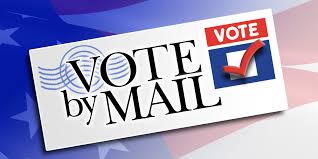 Chamber CEO Erin Predmore Chamber CEO Erin Predmore February is Black History Month, the perfect time to reflect on our community’s diversity. It’s also a time to challenge ourselves, take a hard look at where we fall short – we’re not as diverse or welcoming as we’d like to believe – and take steps to strengthen those areas. In the past year, the Chamber has made a commitment to supporting the work of black business owners in Bloomington and Monroe County. We’ve started an affinity group that meets regularly to strategize about how to raise up their voices and tackle issues specific to growing their businesses. We also surveyed black business owners to get a better handle on their economic impact. The 27 respondents reported a total of $2.557 million in gross annual revenues, employing nearly 60 workers. In total, they reported 237 years in business, reflecting a depth of experience and the important role those businesses have played in our community’s history. The Chamber is honoring part of that history – and acknowledging the often-uncomfortable legacy we share – by placing an historical marker at People’s Park to highlight the significance of that location. In 1968, an African American student named Clarence “Rollo” Turner led protests against racial discrimination that were met with open hostility in Bloomington. That fall, he opened the Black Market in the location where People’s Park is located today. It sold books, clothing, records, artwork and other crafts made in Africa or by African Americans and acted as a cultural center for black students at Indiana University. On December 26, 1968, the Black Market was firebombed, and the entire store destroyed leaving Bloomington residents to grapple with the brutal and harsh realities of racism. Two Ku Klux Klan members were eventually convicted of the arson. In 1970, IU students began developing the vacant lot into People’s Park, a place for activism, recreation and free expression. The marker, awarded by the Indiana Historical Society, will be placed in People’s Park with a celebration on May 1. We’ll be providing more details about the event soon and hope you can join us. Before then, February is full of Black History Month events: discussion panels, lectures, performances, film screenings and other activities throughout the community. I urge you to check out the calendars for Indiana University and the City of Bloomington to find at least one way to get involved. Our past is still very much present – the things that make us proud, as well as the things we struggle to overcome. I hope you’ll join me in working to build a community that embraces everyone. Note: This column by Chamber CEO Erin Predmore was published in the February issue of BizNet, a Chamber publication in partnership with the Bloomington Herald-Times. |
Categories
Categories
All
Archives
Archives
May 2024
|
|
Copyright The Greater Bloomington Chamber of Commerce. All Rights Reserved.

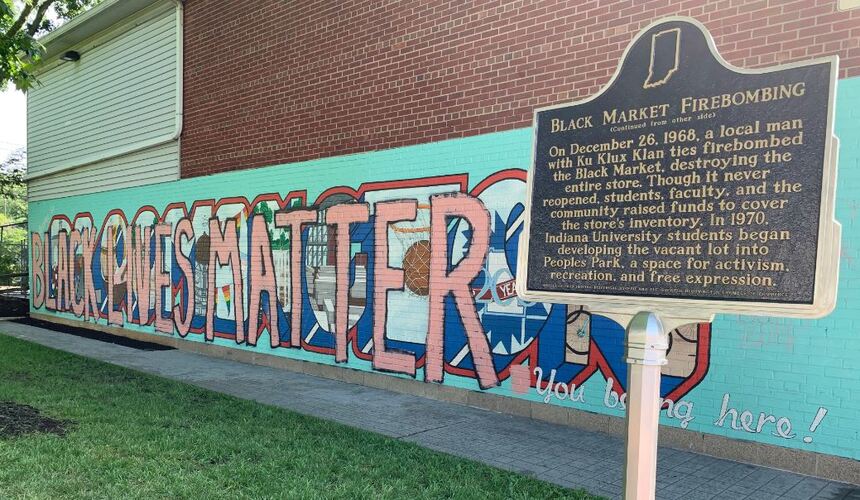
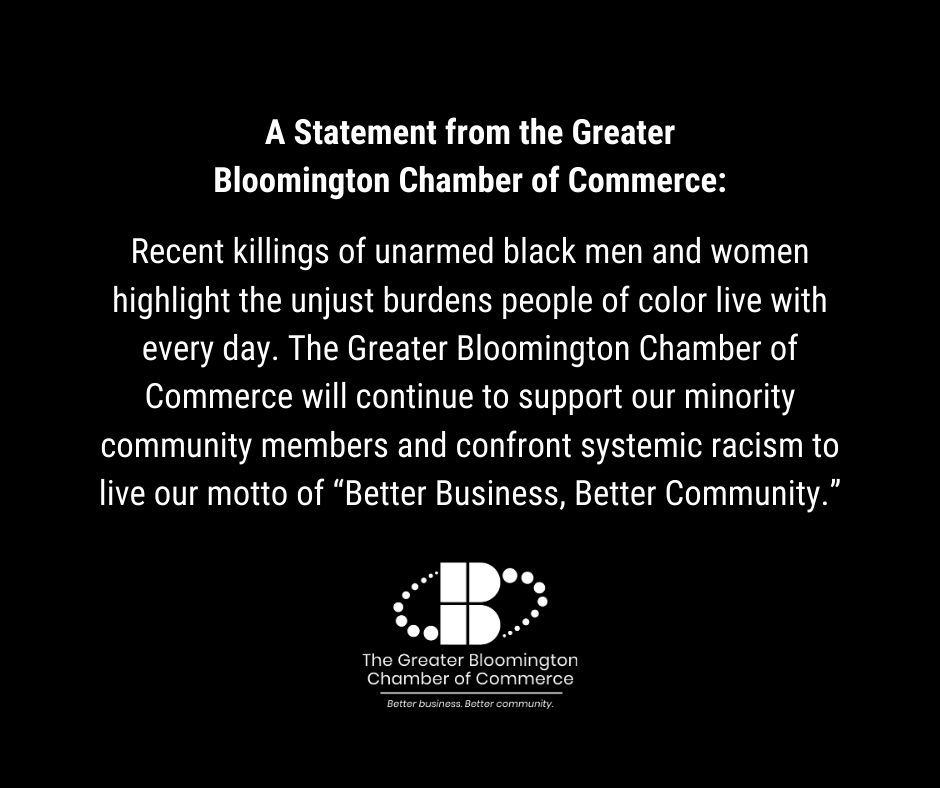
 RSS Feed
RSS Feed
